Hard Work and Determination Pays Off for CSUN’s Newest Graduates
Some are the first in their families to get a college education. Others have been on their own since a young age and had to rely on their own tenacity to get through their classes. Still others have seen war and came to California State University, Northridge determined to get the tools they need to make a positive impact on the world.
The cheers may be deafening next week as nearly 10,000 students are expected to graduate from CSUN. Each student has a personal story of hard work, perseverance and success. Below are examples of just some of these unique stories.
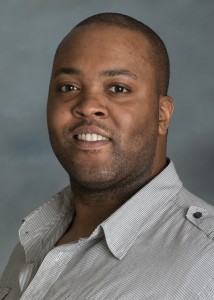
Marcus Johnson
Marcus Johnson, B.A. in Political Science
Never in his wildest dreams, growing up as the child of two postal workers in Grand Rapids, Mich., did Marcus Johnson, 32, of Sherman Oaks, imagine that he would spend his last semester at CSUN sitting in on Congressional hearings on the future of the U.S. Postal Service or the state of the U.S. Department of Veteran Affairs.
The first in his family to graduate from high school — and now the first to graduate from college — Johnson admitted he wasn’t a very good student when he was young and joined the U.S. Navy straight out of high school for the discipline and opportunities it provided. College wasn’t an option.
“My parents weren’t wealthy and college was never something we talked about or aspired to at home,” he said. “The military made sense to me.”
Johnson spent five years on active duty in the Navy, visited three continents and fought in the war in Iraq. In 2005, he left active duty, joined the Navy Reserve and began to look for work. Within three months, he was offered a custodial position with the postal service. He took the job, following his parents’ admonition that any job was better than none at all.
He spent his working hours cleaning urinals and toilets, scraping gum off lobby floors and picking up the messes people left behind. Whenever he got a few minutes to spare, Johnson, who loved to write and read, would hide in a closet or bathroom stall to steal a few minutes with whatever volume he was reading at the moment.
Determined that he wanted more from his life, Johnson signed up for classes at Los Angeles Valley College. “I had no idea how to sign up for college, but I knew that this was the direction I wanted to go,” he said.
It took him six years to finish the classes he needed at Valley College. He had to first figure out how to navigate college, and then juggle his studies while working full time. A one-year deployment with the reserves in the middle of it added to his completion time. In the midst of all that, a chance political science class ignited a passion for politics.
Johnson transferred to CSUN in the fall of 2012 to study political science. Despite taking a full load of classes, he continued to work 40 hours a week as a custodian, only giving up his job earlier this year when he was offered an internship with the U.S. Department of Veteran Affairs in Washington, D.C.
Johnson said he loved his time at CSUN.
“The professors here are amazing,” he said. “They challenged me and made me focus. This university is so much more diverse than anything I experienced in the military. There is nothing like having a discussion in class about something taking place somewhere in the world, and to have one of your classmates speak knowledgeably about the subject because they or their family is from that place. To have different points of view aired in the classroom and encouraged is amazing.”
He will receive his bachelor’s degree during the College of Social and Behavioral Sciences commencement ceremony for undergraduates at 8 a.m. on Wednesday, May 21, on the Delmar T. Oviatt Library lawn at the center of the campus 18111 Nordhoff St. in Northridge. Upon graduation, Johnson has a writer/editor position waiting for him with the U.S. Department of Homeland Security.
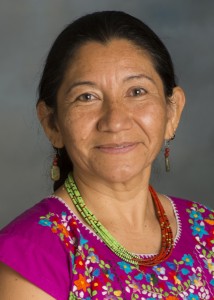
Rossana Perez
Rossana Perez, M.A. in Literature
Rossana Perez’s journey to her master’s degree started more than 30 years ago in her native El Salvador, when her husband, Rodolfo Aguilar, a philosophy professor, left for a meeting and never came back. It was 1981 and military death squads traveled the country targeting people identified as “threats,” real or imagined, to the government.
Perez, then a philosophy student, was herself arrested a short time later by the national police. Her infant daughter was left in the care of her mother. No one knew where she was for several days. When the Red Cross finally found her, she was transferred to a women’s prison, where she was held without charges for nearly 10 months. Upon her release, she and her daughter fled to the United States.
“We arrived June 29, 1983,” recalled Perez, now 56, of Echo Park. “I was really happy to be safe. But I was also numb, and very confused and sad. After all, the United States supported the Salvadoran government.”
A political refugee, Perez started her life over from scratch. She worked in garment factories, struggling to support herself and her daughter, Sara. Unable to forget what was happening in her homeland, she joined efforts to help those fleeing the war in El Salvador, to educate Americans about what was going on in her native country and to help refugees settle into their new home.
As her community organizing efforts grew, Perez became part of a coalition of community activists, students and academics who worked to establish the Central American studies program at CSUN in the late 1990s to encourage research and understanding of the people and cultures of that region. Perez was eventually invited to be a lecturer in the program, which she did from 1999 to 2002. CSUN became the first university in the nation to offer a major in the Central American studies in 2007.
It was while she was teaching at CSUN that Perez decided it was time for her to finish her degree. She initially enrolled at Pasadena City College before transferring to CSUN to major in English literature.
It was not easy. She was working full time, first for the Los Angeles Unified School District and then at the Children’s Institute, a Los Angeles nonprofit dedicated to helping children heal from trauma, abuse and neglect. She was also raising children. Son, Tonatiuh, and younger daughter, Sage, were born in the U.S. There were semesters when she could only take one class. Some days she didn’t finish her homework until well after midnight, only to get up two or three hours later for work. She earned her bachelor’s in 2009 and decided to remain at CSUN to get her master’s degree.
“I love literature because it provides me with a space to better understand human nature,” she said.
Perez will receive her master’s degree during the commencement ceremony for the College of Humanities at 6 p.m. on Thursday, May 22, on the Oviatt Library lawn.
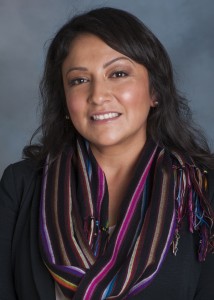
Raquel Roman
Raquel Roman, B.A. in Chicana/o Studies
Tortillas and business savviness helped Raquel Roman make it through CSUN. Tortillas, plus a lot of hard work, late nights that slipped into early mornings drinking coffee and studying at her grandmother’s kitchen table and the ability to juggle her time and operate on very little sleep.
When Roman, 33, of Los Angeles, graduated from high school in 1998, she had every intention of becoming the first in her family to graduate from college. She enrolled at CSUN and immersed herself in her studies. She excelled in most of her classes, but there was one problem — math. Unable to proceed without fulfilling her math requirements, Roman was stopped out and her CSUN studies were put on hold so she could take the required classes at East Los Angeles College.
One thing led to another, and before long, Roman had put her studies on hold indefinitely and landed a job with Proyecto Pastoral at Dolores Mission, working with homeless men in the Boyle Heights area of Los Angeles. In 2008, she became the first female director of the mission’s Guadalupe Homeless Project.
“Through my work at the shelter, I encouraged people to believe in themselves and, to some degree, have been very successful at it,” Roman said. “It was then that I began to feel like a hypocrite and so, in the summer of 2010, I decided to go back to school.”
She re-enrolled at her local community college, and with the help of her “math genius” younger cousin, she fulfilled her math requirements and returned to CSUN.
“I felt like I won the lottery,” Roman said, recalling her reaction when she heard she had been readmitted to the university. “I called admissions and made an appointment for advisement with Mary Dudley in the (College of) Humanities’ Educational Opportunities Office. We planned my first semester back, fall 2011. I will never forget when she looked at me with a smile and said ‘Welcome back!’”
The past three years were not easy, Roman said. State budget cuts affected the availability of some classes, and her salary from the nonprofit was not enough to cover all her expenses. To make a little extra money, she made tortillas on the weekends and sold them to friends to cover the cost of gas, food and school supplies.
She also had to juggle the fact that she worked full time at a homeless shelter and was often on call well into the night, while going to college full time.
“It was a lot of hard work, but I did it,” Roman said. “I am proud to say that I came to CSUN. It feels like home to me.”
Roman will receive her degree during the commencement ceremony for the College of Humanities at 6 p.m. on Thursday, May 22 on the Oviatt Library lawn.
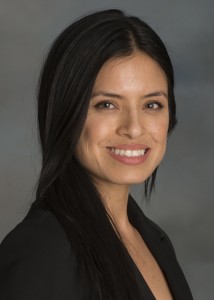
Luisa Sabogal
Luisa Sabogal, M.S. in Family and Consumer Sciences
Luisa Sabogal’s parents had the same dream many other immigrants have when they come to the United States — a chance to start a new life that presents opportunities for their children that may not be available back home.
The Sabogals were successful textile importers in Colombia when they moved to the San Fernando Valley 17 years ago with their three children, in hopes of applying their business acumen to a venture in California. Luisa was 10 years old at that time and didn’t speak a word of English. But after four years, the business had not taken off and the Sabogals returned to Columbia, leaving behind Luisa, who had by then mastered English, with her older brother and sister.
“I was about 14, in the ninth grade at Chatsworth High School, at the time,” said Sabogal, now 28 and living in Sherman Oaks. “My brother and sister, who are older than me, were in college. It just made sense that I would stay behind and finish my education.
“My parents expected me to be responsible, and I was,” she said. “I developed a basic routine when I came home and did my homework before anything else. It never occurred to me to do things differently. My parents trusted me to be responsible, and I wasn’t going to let them down.
“Although at times I felt a void for my parents’ guidance and support throughout my high school years, my teenage brother and sister were surrogate parents. Thankfully, I enjoyed learning and had a strong set of values and morals to keep me going.”
Sabogal, who spoke to her parents regularly via telephone while in high school, said the independence and responsibility her parents gave at such a young age continued to influence the decisions she made and how she comported herself as she got older.
She started her college education at Los Angeles Pierce College before transferring to CSUN in 2009. She earned her bachelor’s in nutrition from the university in 2012 and stayed to get her master’s in nutrition, a requirement for becoming a dietician.
“I was taught by my parents that if you love something enough, then you should do it,” she said. “They took a risk coming here and, while their business didn’t take off, they showed me that sometimes taking risks are worth it if you want to be happy.
“I was taught to follow my dreams, regardless of my circumstances. So I learned to think on my own and become my own motivation. This has supported me in the face of peer pressure and parental absence.”
She said her time at CSUN reenforced that belief. She spent part of 2011 in Guatemala working alongside CSUN faculty members, teaching children in rural villages the importance of making healthy eating choices.
“That experience solidified for me what I wanted to do with my life,” she said. Sabogal now works as a clinical dietician in various communities throughout Los Angeles.
She will formally receive her degree during the College of Health and Human Development’s commencement ceremony at 6 p.m. on Monday, May 19, on the Oviatt Library lawn.
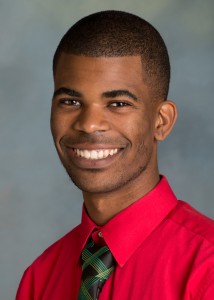
Marquis Williams
Marquis Williams, B.S. in Tourism, Hospitality and Recreation Management
Between the ages of 8 and 12, Marquis Williams, 21, of Northridge, attended more than 15 different schools. His biological parents were no longer able to care for him, so he was placed in foster care while county social workers looked for someone who could take him on a permanent basis.
Williams said the experience of bouncing from school to school made it hard for him to appreciate academics. By the time his grandmother took custody of him and he was ready to start high school, studying and grades were not priorities.
“I was at a school (in South Los Angeles) where the teachers didn’t push college, and I just didn’t care,” he admitted. But that wasn’t good enough for his grandmother, who transferred Williams to a charter high school with a college focus. She was determined to see that he was one of the first in their family to get a college education.
While his grades weren’t perfect, Williams was admitted to CSUN in 2010 via the university’s Educational Opportunities Program, which is designed to provide support to historically low-income, educationally disadvantaged, first-generation college students.
“It was like someone gave me a second chance. Someone believed in me,” Williams said, adding that coming to CSUN “changed my life.”
“CSUN opened so many opportunities up for me,” he said. “I needed to get out of the community that I came from. I wasn’t in a position to leave if it wasn’t for CSUN and the support system and mentors it has provided me.”
Williams threw himself into his studies in a way he had never done before. He also decided to volunteer on and off campus to work with young people with backgrounds similar to his, to show them that college is possible. Among other things, he served as an academic mentor on campus. His efforts earned him a United States Presidential Service Award, which recognizes the efforts of individuals who volunteer their time to make the country a better place.
Williams said he hopes to use what he learned in CSUN’s recreation and tourism management department to someday operate a nonprofit organization that provides support to young people in economically disadvantaged communities and in foster care. He noted that only 2 percent of children in foster care graduate from college.
“I’m lucky to be part of that two percent,” he said. “I want to change that number. I want to make it much higher. I want children in foster care, children who are like I was, to know that they can make it, that there is support out there, and that they can go to college.”
Williams will receive his bachelor’s degree during the College of Health and Human Development’s commencement ceremony at 6 p.m. on Monday, May 19, on the Oviatt Library lawn.

 experience
experience